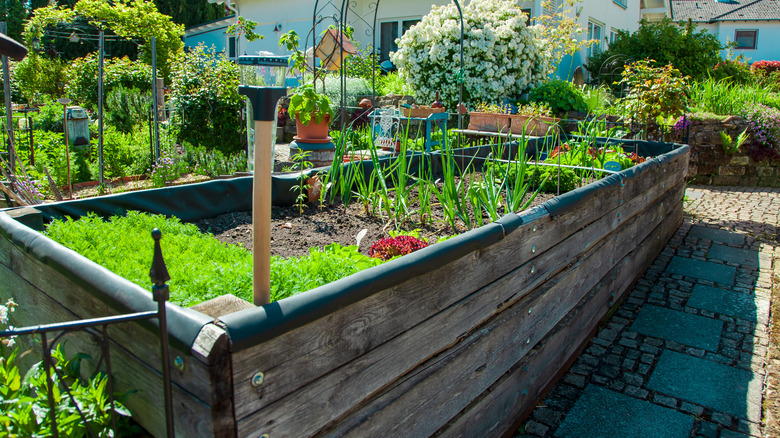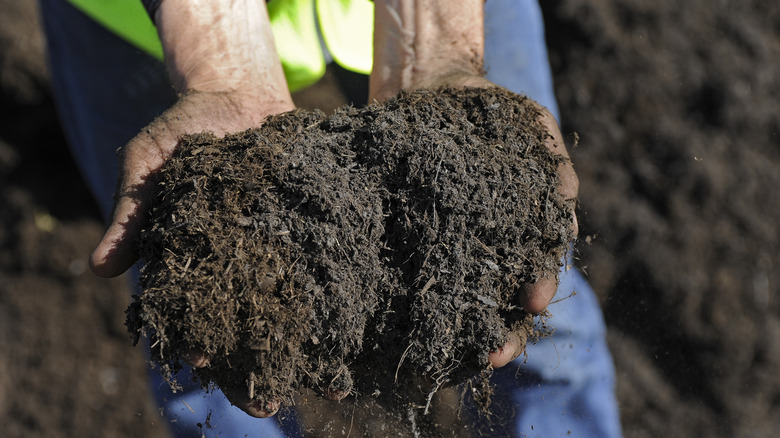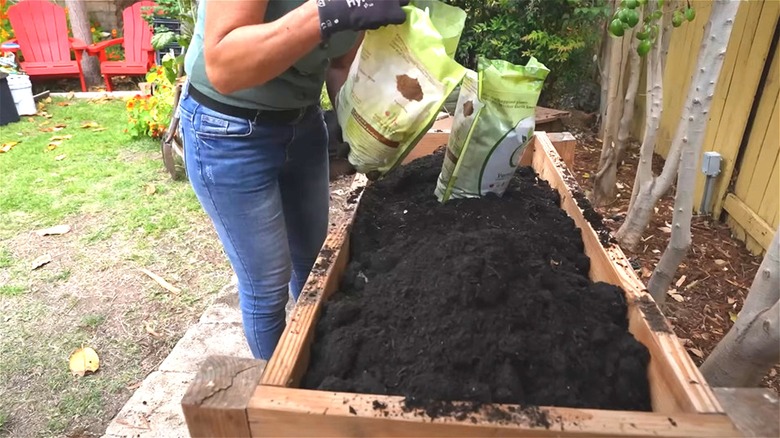Three Important Soil Ingredients You Should Use In A Raised Garden Bed
So, you're setting out to start a raised garden bed, that elevated plot brimming with potential and offering a multitude of benefits from better weed control to improved accessibility. As any seasoned gardener knows, the true potential of a raised bed lies in the soil mixture, and choosing the right composition — topsoil, compost, and nutrient boosters — is paramount. With the perfect blend of these soil ingredients, your raised garden is equipped to flourish in ways it simply couldn't in the often compact soil of neglected in-ground beds.
Unlike in-ground gardens, raised beds aren't complemented naturally by the earth's layers and the organisms that enrich the soil over time. Therefore, your plant's health directly correlates with the quality of the soil you introduce into the bed. As such, ignoring the soil's health is akin to building a house on a shaky foundation and you can expect the plants to struggle to reach their full potential.
Practical wisdom calls for a measured approach to your raised garden bed soil recipe. Let not your creation be a glutton for soil that devours your time and wallet in search of sufficient ingredients. Layering the bottom third with readily-available dry twigs and leaves provides a smart elevation while allowing breath and life from below once the materials start decaying. You also want to top up your raised garden bed to the brim so the settling soil maintains its height. The final step is stirring with gloved hands or a garden fork, complemented by watering.
The foundation: Topsoil and compost
The topsoil is the A-player of your raised garden bed soil recipe, providing structure, aeration, and a home for nutrients and microorganisms. However, the source matters; lean on a well-reputed local garden center or landscape supply company for a tailored option that ensures your raised garden starts on the right foot. Favor dark soil that breaks apart easily and is rich with the scent of earth, and steer clear of sticky or foul-smelling variants or those laden with sand or clay. Alternatively, repurpose soil from plant containers that have served their purpose. Pick out large rocks before filling your garden bed to two-thirds full with topsoil, atop the foundation of sticks and leaves.
Compost (decayed organic matter) fosters plant growth in ways that synthetic fertilizers can only dream of. Brimming with essential nutrients and beneficial microorganisms, it's like a gourmet meal for your green companions. And as if that wasn't enough for your raised garden bed, the decaying matter improves soil structure and boosts water retention. Your best bet lies in making your own DIY compost; it's economical and an excellent way to turn trash (think leaves, straw, kitchen waste, and grass and hedge clippings) into treasure. But should your homemade compost need supplementing, turn to local garden centers and landscape companies. For instance, Evergreen Organic Compost and Manure costs under $4 at Lowe's. Following the guidance of the University of Maryland, 5%-10% organic content should enhance your floral or vegetable bed's prosperity.
Nutrient boosters can't be overlooked
The unseen ensemble that is nutrients nourishes, supports, and propels your garden toward lush, vibrant growth. Enter nitrogen, phosphorus, and potassium, the famed NPK in fertilizers. Nitrogen fuels lush, green leafy growth, phosphorus strengthens the roots and boosts flowering, and potassium is the wizard behind water regulation and disease resistance. Yet, the narrative doesn't end there; calcium for the cell wall structure, magnesium for photosynthesis, and sulfur for nitrogen metabolism and protein synthesis make up the essential supporting cast. Harnessing these nutrients from natural sources champions eco-friendliness, ensuring your plants aren't feasting on synthetic options which, while offering a quick fix, can compromise soil health over time.
You could consider worm castings, a fancy name for fecal matter from worms and a soil amendment with a nutritional profile that reads like a plant's wish list. In fact, it's packed with a nutrient punch far surpassing that of compost. The University of California lays out the blueprint: a simple top dressing of 1 to 3 inches of worm castings, mingled into the soil, fits the bill. Worthy recommendations include Earth Science Pure Earthworm Castings, 4 pounds of which will set you back $6 at Walmart. Similarly, blood meal offers a nitrogen-rich banquet, while bone meal is a phosphorus and calcium powerhouse. Fish emulsion, although pungent, is a nutrient-dense buffet for your plants and a protein supply for soil-enriching microorganisms. However, use these nutrient supplements judiciously, as excess could tip the scales toward unintended outcomes.


